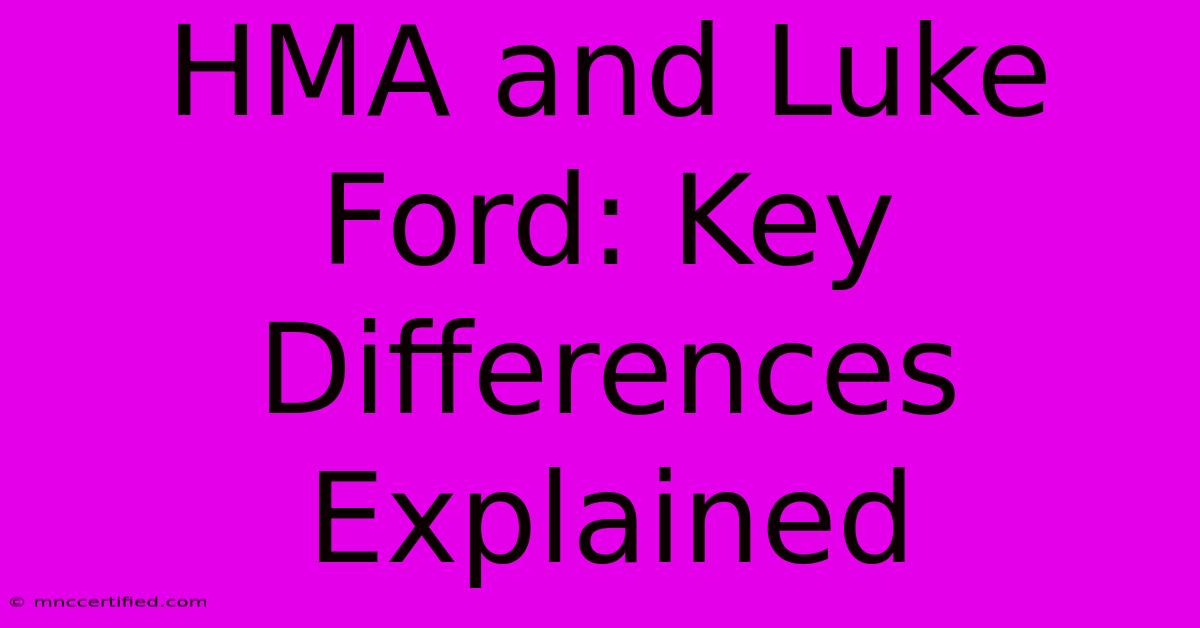HMA And Luke Ford: Key Differences Explained

Table of Contents
HMA and Luke Ford: Key Differences Explained
The online world offers a plethora of VPN services and cybersecurity advice, leading to occasional confusion between seemingly similar offerings. This article clarifies the key differences between HMA (HideMyAss!) VPN and the cybersecurity advice provided by Luke Ford. While seemingly disparate, understanding their distinctions is crucial for informed decision-making regarding your online privacy and security.
HMA (HideMyAss!): A VPN Service
HMA, or HideMyAss!, is a Virtual Private Network (VPN) service. VPNs mask your IP address, encrypt your internet traffic, and route it through a secure server, enhancing your online privacy and security. Key features often touted by HMA include:
- Global Server Network: Access to numerous servers across the globe, allowing you to appear as if you're browsing from a different location. This is useful for bypassing geo-restrictions on streaming services or accessing region-locked content.
- Encryption: HMA uses strong encryption protocols to protect your data from prying eyes, including your internet service provider (ISP) and potential hackers.
- Kill Switch: A feature that automatically cuts your internet connection if the VPN connection drops, preventing accidental exposure of your real IP address.
- No-Logs Policy (claimed): Many VPN providers claim a "no-logs" policy, stating they don't store user activity data. It's crucial to thoroughly research a VPN provider's privacy policy and track record before trusting them with your data. Always verify claims independently.
Limitations of HMA: HMA has faced criticism in the past regarding its logging practices and ownership. Independent research is vital before committing to any VPN service. Consider reading reviews from reputable sources and understanding the potential risks involved.
Luke Ford: A Cybersecurity Analyst and Advocate
Luke Ford is a prominent figure in the online privacy and security community, known for his commentary, analysis, and advocacy. Unlike HMA, which is a product, Luke Ford offers information and opinions on a range of cybersecurity topics. His contributions often include:
- Critical Analysis of VPNs: Luke Ford often analyzes VPN services, including their privacy policies, security protocols, and overall trustworthiness. This analysis can be valuable for consumers seeking to make informed choices.
- Advocacy for Digital Privacy: He's a strong voice advocating for increased online privacy and security, often highlighting threats and vulnerabilities in various online services and technologies.
- Security Tips and Best Practices: His content frequently includes practical tips and best practices for improving your online security, beyond simply using a VPN. This may include password management, secure browsing habits, and awareness of phishing scams.
Key Differences Summarized:
| Feature | HMA (HideMyAss!) | Luke Ford |
|---|---|---|
| Nature | VPN Service Provider | Cybersecurity Analyst & Advocate |
| Offering | VPN service with encryption & server access | Information, analysis, and security advice |
| Focus | Providing a secure connection and anonymity | Educating users about online threats and solutions |
| Direct Usage | Directly used to secure internet connection | Indirectly used to inform decisions about security |
Conclusion: Choosing the Right Approach
HMA and Luke Ford cater to different needs. HMA provides a tool for enhancing online privacy and security, while Luke Ford provides knowledge to help users make informed decisions about their online safety. To maximize your online security, consider using a reputable VPN service after conducting thorough research (informed by sources like Luke Ford’s insights) and implementing the best security practices he advocates. Don't rely solely on a single VPN; understanding the broader landscape of online security is crucial for comprehensive protection. Remember to always verify information from multiple trusted sources and stay up-to-date on evolving threats in the digital landscape.

Thank you for visiting our website wich cover about HMA And Luke Ford: Key Differences Explained. We hope the information provided has been useful to you. Feel free to contact us if you have any questions or need further assistance. See you next time and dont miss to bookmark.
Featured Posts
-
Watch Southampton Vs Liverpool Lineup And Odds
Dec 19, 2024
-
Slower Rate Cuts Expected In 2025
Dec 19, 2024
-
Real Madrid 3 0 Pachuca Intercontinental Cup
Dec 19, 2024
-
Verstappen Reacts Perez Leaves Red Bull
Dec 19, 2024
-
Mary Berry Airport Arrest And Family Tragedy
Dec 19, 2024